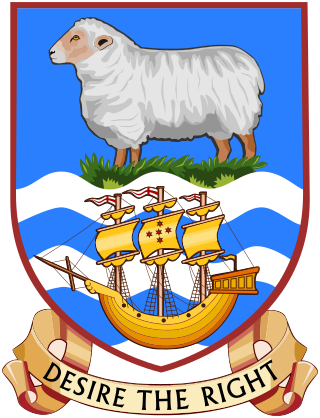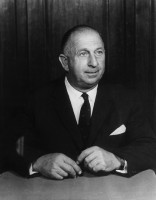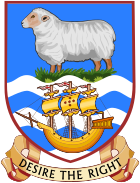
The politics of the Falkland Islands takes place in a framework of a constitutional monarchy and parliamentary representative democratic dependency as set out by the constitution, whereby the Governor exercises the duties of head of state in the absence of the monarch, and the Chief Executive is the head of the Civil Service, with an elected Legislative Assembly to propose new laws, national policy, approve finance and hold the executive to account.

A Crown colony or royal colony was a colony governed by England, and then Great Britain or the United Kingdom within the English and later British Empire. There was usually a governor to represent the Crown, appointed by the British monarch on the advice of the UK Government, with or without the assistance of a local council. In some cases, this council was split into two: an executive council and a legislative council, and the executive council was similar to the Privy Council that advises the monarch. Members of executive councils were appointed by the governors, and British citizens resident in Crown colonies either had no representation in local government, or limited representation in a lower house. In several Crown colonies, this limited representation grew over time. As the House of Commons of the British Parliament has never included seats for any of the colonies, there was no direct representation in the sovereign government for British subjects or citizens residing in Crown colonies.
A member of the Legislative Assembly (MLA) is a representative elected to sit in a legislative assembly. The term most commonly refers to members of the legislature of a federated state or an autonomous region, but is also used for several national legislatures.

The governor of the Falkland Islands is the representative of the British Crown in the Falkland Islands, acting "in His Majesty's name and on His Majesty's behalf" as the islands' de facto head of state in the absence of the British monarch. The role and powers of the governor are set out in Chapter II of the Falkland Islands Constitution. The governor in office resides at Government House, which serves as the official residence.

The Legislative Assembly of the Falkland Islands is the unicameral legislature of the British Overseas Territory of the Falkland Islands. The Legislative Assembly replaced the Legislative Council when the new Constitution of the Falklands came into force in 2009 and laid out the composition, powers and procedures of the islands' legislature.

Elections were held in the Australian state of Victoria on 15 July 1961 to elect the 66 members of the state's Legislative Assembly and 17 members of the 34-member Legislative Council. MLAs were elected for three year terms and MLCs were elected for six year terms. All were elected in single-member districts or provinces using preferential voting.

The Falkland Islands Constitution is a predominantly codified constitution documented primarily within the Falkland Islands Constitution Order 2008, a statutory instrument of the United Kingdom. The constitution, in its present form, was made on 5 November 2008 by Queen Elizabeth II in a meeting of the Privy Council at Buckingham Palace. It was laid before Parliament on 12 November 2008 and came into force on 1 January 2009, replacing the 1985 constitution.

The Falkland Islands general election of 2009 was held on Thursday 5 November 2009 to elect members to the Legislative Assembly. It was the first general election in the Falkland Islands since the new constitution came into force on 1 January 2009, which replaced the old Legislative Council with the Legislative Assembly. Chief Executive Tim Thorogood acted as Returning Officer.

The Falkland Islands general election of 2005 was held on Thursday 17 November 2005 to elect members to the Legislative Council. It would be the last general election in the Falkland Islands before the new constitution came into force, which replaced the Legislative Council with the Legislative Assembly. Chief Executive Chris Simpkins acted as Returning Officer.

The Falkland Islands general election of 2013 was held on Thursday 7 November 2013 to elect all eight members of the Legislative Assembly through universal suffrage using block voting, with each Stanley constituent having up to 5 votes and each Camp constituent having up to 3 votes. A total of 1,046 ballots were cast in Stanley, representing a turn-out of 75.4%, and 242 ballots in Camp, representing a turn-out of 85.5%. As no political parties are active in the Falklands, all the candidates stood as Independents. The Chief Executive of the Falkland Islands, Keith Padgett, acted as returning officer. It was the second election since the new Constitution came into force replacing the Legislative Council with the Legislative Assembly.

The Falkland Islands general election of 1952 was held in May and June 1952 to elect members to the Legislative Council. Four out of the twelve Councillors were elected through universal suffrage, two from Stanley and one each from East Falkland and West Falkland. Owing to the remoteness of some settlements and the unpredictability of the weather on the Falkland Islands, the election took place over several days.

The Falkland Islands general election of 1956 was held in March and April 1956 to elect members to the Legislative Council. Four out of the twelve Councillors were elected through universal suffrage, two from Stanley and one each from East Falkland and West Falkland. Owing to the remoteness of some settlements and the unpredictability of the weather on the Falkland Islands, the election took place over several days.

The Falkland Islands general election of 1964 was held on 16 and 17 March 1964 to elect members to the Legislative Council. Four out of the ten Councillors were elected through universal suffrage, two from Stanley and one each from East Falkland and West Falkland. It was the first election in the Falklands after the number of Councillors was reduced from twelve to ten, with the abolition two appointed members of the Council. Marjorie Vinson became the first woman to be elected to the Council, winning the seat of East Falkland.

The Falkland Islands general election of 1968 was held on 13–15 March 1968 to elect members to the Legislative Council. Four out of the ten Councillors were elected through universal suffrage, two from Stanley and one each from East Falkland and West Falkland.

The Falkland Islands general election of 1971 was held on 30 November – 2 December 1971 to elect members to the Legislative Council. Four out of the ten Councillors were elected through universal suffrage, two from Stanley and one each from East Falkland and West Falkland.

The Falkland Islands general election of 1976 was held in 1976 to elect members to the Legislative Council. Four out of the ten Councillors were elected through universal suffrage, two from Stanley and one each from East Falkland and West Falkland. The election was delayed twice, first in November 1975 when the dissolution of the Legislative Council was postponed by ten weeks to 31 January 1976 and then again in January 1976 when it was postponed to 28 February 1976. This was done in the hope that the election would be held under the proposed new constitution and to allow the Falkland Islanders opportunity to study the report of the Select Committee before the election took place. In reality, the new constitution did not come into force until the following year, with the first election under the new constitution taking place in October 1977, just 15 months after the last election.

The Falkland Islands general election of 1977 was held on Thursday 6 October 1977 to elect members to the Legislative Council. Six Councillors were elected through universal suffrage, one from each constituency.

The Falkland Islands general election of 2021 was held on Thursday 4 November 2021 to elect all eight members of the Legislative Assembly through universal suffrage using block voting, with the Chief Executive of the Falkland Islands acting as returning officer. It was the fourth election since the new Constitution came into force replacing the Legislative Council with the Legislative Assembly.

The next Falkland Islands general election will elect all eight members of the Legislative Assembly through universal suffrage using block voting, with the Chief Executive of the Falkland Islands acting as returning officer. It will be the fifth election since the new Constitution came into force replacing the Legislative Council with the Legislative Assembly.





